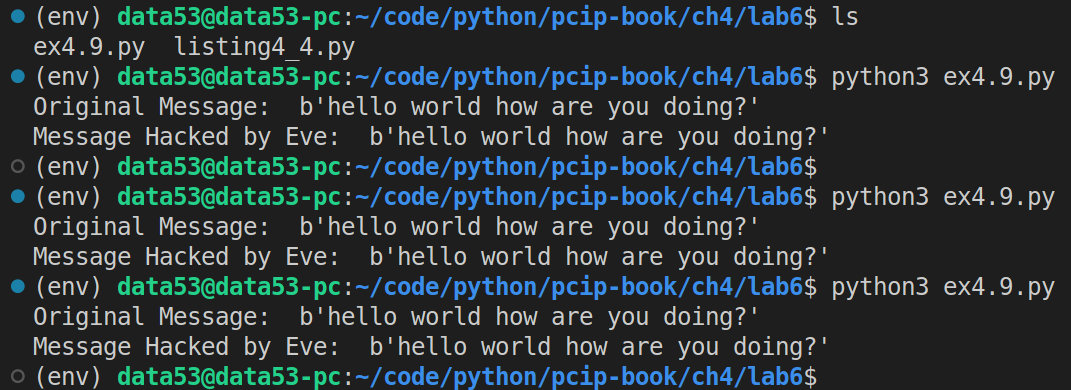4.9 COMMON MODULUS ATTACK
EXERCISE 4.9: COMMON MODULUS ATTACK
Test out the code in this section by creating a common modulus attack demo.
Suppose the following code is inside of a file called ex4.9.py.
Also note that, listing4_4.py is the code given in Listing 4.4 of the book.
from cryptography.hazmat.backends import default_backend
from cryptography.hazmat.primitives.asymmetric import rsa
import listing4_4 as l
def bezouts_theorem(a: int, b: int) -> (int, int):
'''
Let a and b be positive integers. Then the equation
a*u + b*v = gcd(a,b) [Bezout's Theorem]
always has a solution in integers u and v.
This function simply returns those integers (u,v) as a tuple.
'''
class BezoutNumber:
def __init__(self, num: int, coeff_of_a: int, coeff_of_b: int):
self.num = num
self.u = coeff_of_a # u is a coefficient of a.
self.v = coeff_of_b # v is a coefficient of b.
assert(self.u * a + self.v * b == self.num)
def __lt__(self, x):
assert(isinstance(x, BezoutNumber))
return self.num < x.num
def __mod__(self, rhs):
assert(isinstance(rhs, BezoutNumber))
# print("self: ", self, "\trhs: ", rhs)
u_i = self.u
v_i = self.v
u_ip1 = rhs.u # u_{i+1}
v_ip1 = rhs.v
q_ip1 = self.num // rhs.num
return BezoutNumber(
num=self.num % rhs.num,
coeff_of_a=u_i - u_ip1 * q_ip1,
coeff_of_b=v_i - v_ip1 * q_ip1,
)
def __str__(self):
return f"{self.u} * {a} + {self.v} * {b} = {self.num}"
def bezout_gcd(a: BezoutNumber,b: BezoutNumber)->BezoutNumber:
'''
impelements the euclidean algorithm for finding
gcd: greatest common divisor
'''
while True:
if a < b:
a,b = b,a
if b.num == 0:
return a
a,b = b,a%b
result = bezout_gcd(
a = BezoutNumber(num=a, coeff_of_a=1, coeff_of_b=0),
b = BezoutNumber(num=b, coeff_of_a=0, coeff_of_b=1),
)
return (result.u, result.v)
def common_modulus_decrypt(c1, c2, key1, key2):
key1_numbers = key1.public_numbers()
key2_numbers = key2.public_numbers()
if key1_numbers.n != key2_numbers.n:
raise ValueError("Common modulus attack requires a common modulus")
n = key1_numbers.n
if key1_numbers.e == key2_numbers.e:
raise ValueError("Common modulus attack requires different public exponents")
e1, e2 = key1_numbers.e, key2_numbers.e
a, b = bezouts_theorem(e1, e2)
mx = pow(c1, a, n)
my = pow(c2, b, n)
# Note that, although not stated explicitly we are assuming that
# the gcd(e1, e2) = 1.
return mx * my % n
if __name__ == '__main__':
private_key1 = rsa.generate_private_key(
public_exponent=65537,
key_size=2048,
backend=default_backend(),
)
public_key1 = private_key1.public_key()
n = public_key1.public_numbers().n
public_key2 = rsa.RSAPublicNumbers(3, n).public_key(default_backend())
message = b"hello world how are you doing?"
message = l.bytes_to_int(message)
c1 = l.simple_rsa_encrypt(message, public_key1)
c2 = l.simple_rsa_encrypt(message, public_key2)
print("Original Message: ", l.int_to_bytes(message))
print("Message Hacked by Eve: ", l.int_to_bytes(
common_modulus_decrypt(
c1=c1,
c2=c2,
key1=public_key1,
key2=public_key2,
)
))Execution:
